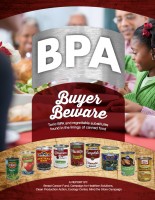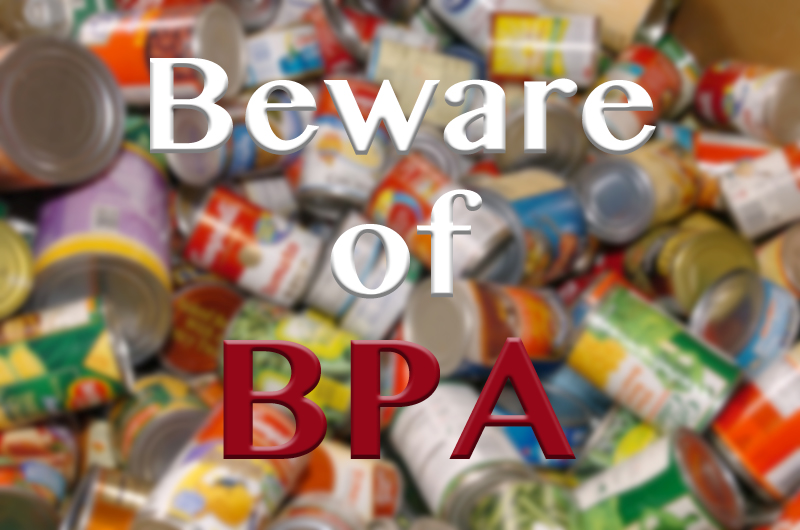The use of Bisphenol A (BPA) in bottles, canned foods, and even medical products has been hotly debated for more than a decade. The toxic chemical has been cited in numerous studies as a hormonal disruptor, contributing to a higher risk of asthma, certain types of cancers, type-2 diabetes, obesity, infertility, and attention deficit disorder, along with other health issues.

A report released today calls out “alarming” findings on the presence of BPA in canned foods. “Buyer Beware: Toxic BPA & Regrettable Substitutes in the Linings of Canned Food”, analyzed 192 canned foods, from fruits and vegetables to soups and gravy to milk for the presence of BPA and other chemicals.
“This report is meant to serve as a wake-up call for national brands and retailers of canned food who are jumping from the frying pan into the fire by eliminating BPA and potentially replacing it with regrettable substitutes,” the report’s authors state. “Consumers want BPA-free canned food that is truly safer, not canned food lined with chemicals that are equally or more toxic.”
The Good News
The following food companies are no longer using BPA, and the chemical was not found in any of the cans tested from:
- Amy’s Kitchen
- Annie’s Homegrown
- Hain Celestial
- ConAgra
“Our analysis showed that, across the board, canned food manufacturers both large and small are not making good on their promises to discontinue use of BPA.” – Buyer Beware: Toxic BPA & Regrettable Substitutes in the Linings of Canned Food
The Bad News
“Grocery stores, big box retailers and dollar stores are not doing enough to eliminate and safely replace BPA in their canned food,” according to the report. About 62% of retailers’ private label canned food tested positive for BPA-based epoxy resins, including those from Albertsons, Dollar General, Dollar Tree, Kroger, Target (100%), Trader Joe’s, Walmart (88%) and Whole Foods. However, some of these retailers have adopted policies to lower BPA use in their cans. Whole Foods, for example, has stated that its buyers are not accepting new cans that have BPA in the lining. The report called out the following national companies for testing positive for BPA in its cans:
- Campbell Soup Company: 15 out of 15 cans
- Del Monte: 10 out of 14 cans
- General Mills: 6 out of 12 cans
- McCormick & Co: (Thai Kitchen). 3 out of 3
- Nestle Carnation: 3 out of 3
According to the report, Campbell’s, McCormick and Nestle have stated that they will move away from using BPA either this year or in 2017.
Although some companies may have initiatives in place to halt the use of BPA-based epoxy in canned goods, some of the other substitutes could be harmful as well. Aside from BPA, the main types of coatings found among the tested cans were acrylic resins (some of which were polystyrene, which is a potential human carcinogen), oleoresin, polyester resin, and polyvinyl chloride copolymers (a known carcinogen, PVC was found in 18% of private-label cans and 36% of national brands).
The report recommends that manufacturers and retailers make a commitment (and provide a timeframe) to eliminate BPA from all packaging and find safe substitutes. This may be easier said than done considering there isn’t a wealth of data on the safety of BPA-epoxy substitutes. The authors called on industry to take several additional actions:
- Accountability on the part of can-lining suppliers via public disclosure of the chemical composition of can linings, along with assessment of their effect on health
- For Congress to adopt the “Ban Poisonous Additives Act”, which bans the use of BPA in food containers
- Labeling of all chemicals used in liners
Twenty-two organizations in 19 states and Ontario, Canada participated in the report, which was produced by the Breast Cancer Fund, Campaign for Healthier Solutions, Clean Production Action, Ecology Center, Safer Chemicals Healthy Families’ Mind the Store Campaign, and Environmental Defence.





What an incredibly biased and sensationalized article! Congratulations to this reportedly seasoned journalist for being a willing pawn of the NGO’s behind this report. I have no relationship with the food companies but am a scientist who has read extensively on BPA. The editor should read the FDA’s assessment of the actual risk presented by BPA before publishing this example of modern yellow journalism that is completely lacking in fiduciary balance.